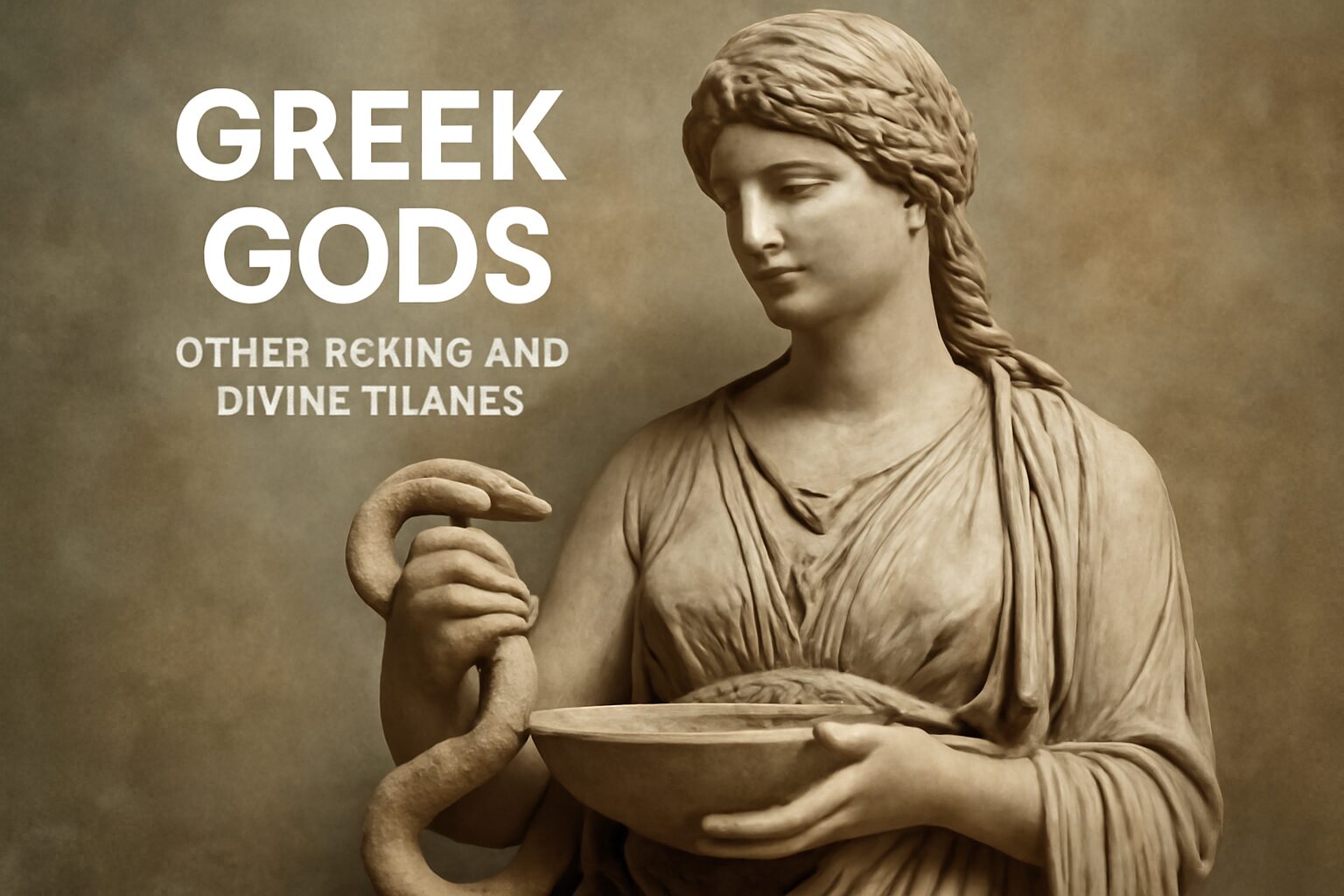Hygieia: The Goddess of Health and Cleanliness
In Greek mythology, Hygieia (also spelled Hygeia) was the goddess of health, cleanliness, and sanitation. Her name is the source of the modern word "hygiene," reflecting her enduring influence. As a personification of preventive medicine and well-being, she played a vital role in ancient Greek beliefs about health and healing.
Daughter of Asclepius
Hygieia was the daughter of Asclepius, the god of medicine, and Epione, the goddess of soothing pain. She was one of the Asclepiadae, a group of deities associated with healing. While her father represented curative medicine, Hygieia embodied the principles of maintaining health through cleanliness and prevention—a concept remarkably advanced for ancient times.
Symbols and Depictions
Artistic representations typically show Hygieia as a young woman holding or feeding a large serpent, which was a symbol of healing in Greek culture (and remains a symbol of medicine today). She often carried a cup or bowl, from which the snake would drink. This imagery later evolved into the modern Bowl of Hygieia symbol used by pharmacists worldwide.
Powers and Worship
Unlike many Olympian gods, Hygieia didn't wield flashy powers but represented the crucial daily practices that maintained health. Her cult was closely associated with healing sanctuaries called Asclepieions, where she was worshiped alongside her father. Followers believed that honoring Hygieia could prevent illness before it started, making her worship particularly important in times of plague.
Relationships and Significance
Hygieia was often grouped with her sisters Panacea (goddess of universal remedy), Iaso (goddess of recuperation), Aceso (goddess of healing), and Aglaia (the splendor of good health). Together they represented different aspects of the healing arts. While not one of the major Olympians, Hygieia's importance grew as Greek medicine advanced, particularly in the 5th century BCE when preventive medicine became more valued.
Legacy
Hygieia's influence extends far beyond ancient Greece. The emphasis on cleanliness and prevention she represented foreshadowed modern public health concepts. Her symbols remain in use in medical professions, and her name continues to represent health maintenance in words like "hygiene." In a world increasingly focused on wellness and prevention, this ancient goddess's relevance endures.
Alternative Names for Hygieia
God Name: Salus (Roman)
In Roman mythology, Hygieia was equated with Salus, the goddess of health and well-being. Salus was worshiped as a personification of public welfare and safety, similar to Hygieia's role in Greek mythology.
God Name: Hygiea (Greek)
An alternative spelling of Hygieia, often used in ancient texts and inscriptions. It reflects variations in Greek dialects and transliterations over time.
God Name: Hygia (Greek)
A shortened or poetic form of Hygieia, sometimes found in literature and hymns. It simplifies the name while retaining its meaning and association with health.
God Name: Valetudo (Roman)
In some Roman contexts, Hygieia was associated with Valetudo, the goddess of personal health. However, Valetudo had a more specific focus on individual well-being compared to Salus.
Tales about Hygieia
Hygieia and Asclepius: The Healing Partnership
In the divine halls of Asclepius, the god of medicine, his daughter Hygieia was an indispensable ally. While Asclepius wielded the serpent-entwined staff to cure ailments and perform miraculous healings, Hygieia focused on the preservation of health through cleanliness and preventive care. She was often depicted offering a bowl from which a serpent drank, symbolizing the cycle of health and renewal.
A Lesson in Prevention
One tale tells of a plague threatening a mortal village. Asclepius arrived with remedies to heal the sick, but Hygieia taught the villagers to purify their water, maintain clean homes, and follow balanced diets. Her teachings prevented further outbreaks, showcasing that health was not merely the absence of disease but a state of holistic well-being. Together, father and daughter embodied the dual aspects of healing: cure and prevention.
Hygieia and Panacea: Sisters in Wellness
Hygieia and her sister Panacea were revered as complementary forces in the realm of health. While Hygieia personified hygiene and prevention, Panacea was the goddess of universal remedy, known for her ability to heal any affliction with her vast knowledge of herbs and potions.
The Pact of Balance
Legend says that the sisters once collaborated to save a kingdom plagued by a mysterious illness. Panacea concocted a potent cure from rare herbs, while Hygieia implemented strict sanitary practices to prevent recurrence. Their combined efforts not only eradicated the disease but also established a legacy of integrated healthcare. This story highlights the ancient understanding that true health requires both effective treatment and proactive maintenance, a wisdom that resonates through the ages.
Frequently Asked Questions
Who is Hygieia in Greek mythology?
Hygieia is the Greek goddess of health, cleanliness, and hygiene. She is one of the daughters of Asclepius, the god of medicine, and often depicted with a snake drinking from a bowl, which became a symbol of medicine.
Why is Hygieia important in Greek mythology?
Hygieia represents the importance of health and preventive care in ancient Greek culture. Her role highlights the connection between cleanliness and well-being, a concept that remains relevant in modern healthcare practices.
What can we learn from Hygieia's symbolism?
Hygieia's association with hygiene and health teaches the value of maintaining cleanliness and taking proactive steps to prevent illness. Her symbolism emphasizes that good health starts with daily care and healthy habits.
How does Hygieia's influence apply today?
Hygieia's legacy lives on in modern medicine and public health. Her name is the root of the word 'hygiene,' and her principles of cleanliness and disease prevention are foundational in healthcare systems worldwide.
Are there other deities related to health in Greek mythology?
Yes, besides Hygieia, her father Asclepius is the god of medicine, and her sisters like Panacea (goddess of universal remedy) also represent aspects of healing. Together, they symbolize different facets of health and medicine.













